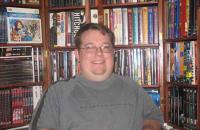By Chris Kavan - 08/25/11 at 11:17 AM CT
Forget that 2008 abomination with Keanu Reeves and some hungry black cloud – this is the only version that is worth watching.
Just think about all the movies you’ve seen this year or even just heard about. Now, work that mind of years and think 60 years in the future – how many films released this year will matter in that time?
Despite being released in 1951, The Day the Earth Stood Still remains popular because its message is one that resonates with all generations. The story is quite simple, an alien craft lands on the Mall in Washington, D.C. A human-looking space man emerges, declares he’s there for peace and then is immediately fired upon by a trigger-happy, nervous soldier. Then Gort, a robot emerges and isn’t as accommodating.
Our spaceman is taken in for observation, but soon escapes. He takes lodging, befriends a young boy, meets a scientist and observes the reaction to his presence. In the end, he leaves Earth with a message – if we can’t learn to be peaceful with each other, we will be destroyed.
While the message was meant as a warning – seeing as it was released just after WWII when the Cold War, Red Scare and tensions were mounting – the message remains just as powerful today and it’s obvious that we are still destroying ourselves. There is no master robot race to police us and make sure we follow the rules – and as a race we’re pretty terrible at policing ourselves without resorting to more violence.
It’s one of my favorite, and I dare say most important, science fiction films. Some say the ending is too abrupt or that the story is over-simplified, but all things considered, it has aged much better than most of the 1950s-60s films. The effects aren’t spectacular, but they aren’t terrible either. Gort is an iconic creature and the phrase “Klaatu barada nikto” shows up in Army of Darkness (where Ash cannot get the phrase right, dooming us all!) and George Lucas also used each section in Return of Jedi (Nerd Alert: Klaatu and Barada are part of Jabba’s skiff guards while Nikto is used as the names of species).
Michael Rennie gives Klaatu a grounded, serious manner. His emotions are also kept in check – even at the end when he gives his warning, he keeps things level. Christian allegory runs high as he takes the name “Carpenter” and later apparently dies only to be resurrected. While these themes are not exactly overt, you don’t have to look to deep to see them either.
Sam Jaffe, who plays the Einstein-like scientist, was also, ironically, one of the many actors target for blacklisting during this period for being sympathetic to Communism. This would be his last role in Hollywood for seven years due to the backlash.
Patricia Neal plays the cool-headed Patricia Neal – but according to Neal herself, she was expecting this to just be another pulpy space saucer movie and had no idea it would become so popular and retain that popularity.
Bernard Herrmann provides the sci-fi score – utilizing one of the greatest sci-fi instruments to full effect: the Theremin. This instrument would become a staple in the many low-budget films of the era, but Herrmann used it to great effect and Danny Elfman has said it was one of the reasons he become a composer.
Certain films deserve to stand the test of time. And while you may not consider The Day the Earth Stood still in the same league as, say, Citizen Kane or The Godfather, you also cannot doubt its staying power. With a message as universal as the one it delivers, it is a film that deserves to be remembered and one I have no doubts about recommending to anyone – sci-fi fan or not.




